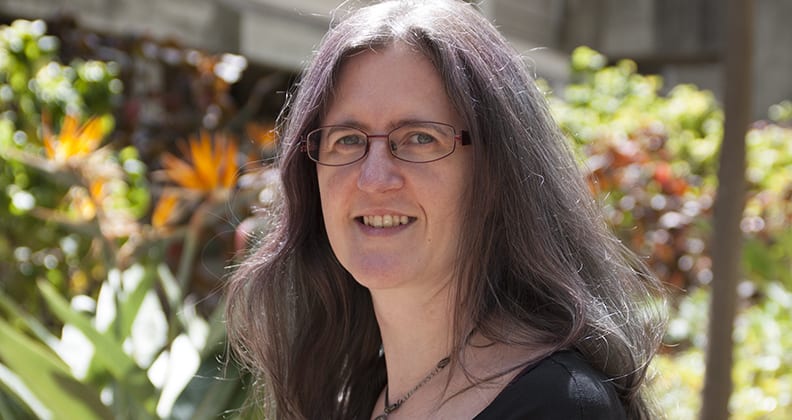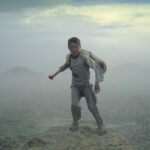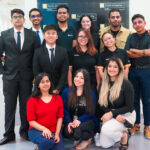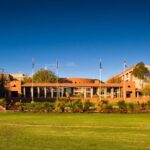Dr Alison Blyth has always been fascinated by the question, “What’s underneath?”.
A research fellow in Curtin’s Departments of Geology and Chemistry, Blyth’s intrigue for understanding what makes up the natural world goes back to when she was a young girl in the UK and would comb the beach for fossils and shells with her grandfather. Blyth says the natural world has always been a part of her life, and this affinity has seen her accrue a wealth of knowledge across fields including geology, chemistry, environmental science, palaeontology and archaeology.
Blyth’s love for all things science has coexisted with a diagnosis of Ehlers-Danlos Syndrome, a genetic disorder that affects up to one in 5,000 people and alters the body’s ability to produce collagen. For Blyth, this means her connective tissue is too stretchy, causing her joints to easily shift or dislocate. She experiences constant pain and chronic fatigue, and has periods where she uses crutches or a wheelchair because she is unable to walk normally.
Ehlers-Danlos Syndrome can be managed with physiotherapy but there is currently no cure. Blyth’s diagnosis poses obstacles to her pursuit of her research interests, but she explains it has not thwarted them.
“You have a set amount of energy and you have to choose what you spend that energy on. I currently spend it largely on my research and teaching work,” she says.
“It impairs some of things you can do. I’m not allowed to do anything that puts undue strain on my joints, so I can’t run, climb, write by hand for long periods or carry heavy objects. Sometimes I can’t walk. But I can do a remarkable amount – probably far more than able-bodied people expect – as long as I manage my resources carefully. My diagnosis doesn’t affect my academic ability, my mind as a researcher, nor who I am or how I think.”
As a teenager, Blyth was certain she wanted to study archaeology or geology at university, but because of her disability she was able to take only limited subjects at high school, which curtailed her university options.
“A lot of my educational background was shaped by disability, because it affected how much I could go to school, and I’m old enough to be of a time when people could actually say, ‘No, we’re not taking you for the subject because of this’, which is just something that wouldn’t happen now,” she says.
Despite obstacles to her education, Blyth completed undergraduate, masters and PhD programs, and has forged a successful and varied career as a researcher in geochemistry, including being awarded a research fellowship at the University of Cambridge in 2007.
Blyth moved to Australia on an AINSE Research Fellowship in 2012 and is now based in Curtin’s Department of Applied Geology. She is a member of the Organic Isotope Geochemistry node of The Institute for Geoscience Research (TIGeR), and works with ecologists from the Department of Environment and Agriculture. Her work uses geochemical techniques to find out how Australia’s environments and ecosystems respond to climatic and human pressures. She is also the current unit co-ordinator and lecturer for Geoscience, Environment and Society, and contributes as a project supervisor to the geology and chemistry honours programs.
Blyth says the obstacles she experienced in her early years as a student have given her better insight into what it can be like for today’s students who have a medical condition or disability. She wants to make sure these students get the help they need to achieve their academic goals.
“From a teaching point of view, it has given me empathy and insight into what these students need, how they experience university life and how they want to experience it, and what obstacles are preventing that,” she says.
“The big message for students is, if you have a medical condition or you have a disability, go to Student Services and get a Curtin Access Plan. If I’ve got a student in one of my units who has a Curtin Access Plan, I will try as much as possible to adapt classes and assessments so that person is accessing the unit on the same basis as everyone else … it’s not making yourself into a special snowflake, it’s just making the playing field level so you can achieve what you are capable of.”
For people who have newly been diagnosed with Ehlers-Danlos Syndrome, or any medical condition or disability, Blyth offers sensible advice.
“Not panicking is a good start. People will have varying perceptions about what a medical condition or a disability means, and they will, to a certain extent, try and impose those on you, but you don’t have to accept them. Follow your doctor’s advice for your diagnosis, but try and stay engaged, stay active and don’t assume that just because it’s a disability it’s a restriction.
“If you’ve got something you really want to do, don’t let the disability stop you. Yes you may have to fight, but look for allies; look for people like me, and for people within Student Services.”
Disability Awareness Week is held from 27 November to 3 December and celebrates the achievements and contributions of people with a disability. Curtin is sharing stories like Alison’s to raise awareness of and promote disability within the University and wider community.



